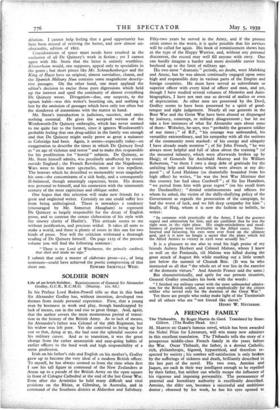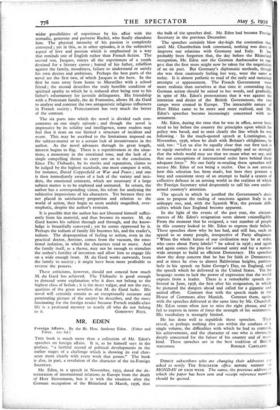A FRENCH FAMILY
M. MARTIN DU GARD'S famous novel, which has been awarded the Nobel Prize for Literature, will win many new admirers in this excellent translation. The Thibaults tells the story of a prosperous middle-class French family in the years before the War. Oscar Thibault, the father, is a devout Catholic, rich, philanthropic, bigoted, hypocritical, and therefore re- spected by society ; his sombre self-satisfaction is only broken by the sufferings of sickness and death, brilliantly described in the last part of the novel. His two sons, Antoine and Jaques, are each in their way intelligent enough to be repelled by their father, but neither can wholly escape the influence of his vigorous and imposing personality. The permanence of paternal and hereditary authority is excellently described. Antoine, the elder son, becomes a successful and ambitious doctor ; obsessed by his work, he has his eyes opened to wider possibilities of experience by his affair with the nomadic, generous and perverse Rachel, who finally abandons him. The physical intensity of his passion is completely conveyed ; yet in this, as in other episodes, it is the subjective aspect of love and passion which is emphasised in a .way that reminds one of English rather than French fiction. The second son, Jacques, enjoys all the experiences of a youth destined for a literaiy career ; hatred of his father, rebellion against the family, moodiness, failure to Understand or satisfy his own desires and ambitions. Perhaps the best parts of the novel are the first two, of which Jacques is the hero. In the first he runs away from home to Marseilles with a school friend ; the second describes the truly horrible condition of spiritual apathy to which he is reduced after being sent to his father's reformatory for juvenile delinquents. His friendship with a Protestant family, the de Fontanins, allows M. du Gard to analyse and contrast the two antagonistic religious influences in French society ; Protestantism has very much the better of the contrast.
The six parts into which the novel is divided each con- centrates on one single episode ; and though the novel is impressive by its solidity and intelligence, some readers may feel that it rests on too limited a structure of incident and event. This may be ascribed to the limitations imposed on the subject-matter or to a certain lack of inventiveness in the author. As the novel advances through its great length, interest begins to flag. There is a repetitivenes in the situa- tions, a monotony in the emotional tone, and the lack of a single compelling theme to carry one on to the conclusion. Since The Thibaults, by its merits and reputation, claims to be judged by the highest standards, one must compare it with, for instance, David Copperfield or War and Peace ; and one is then immediately aware of a lack of the variety and inci- dent, the emotional contrasts, which are necessary if a large subject matter is to be explored and animated. In return, the author has a corresponding virtue, his talent for analysing the subjective impressions of his characters. Yet because they are not placed in satisfactory proportion and relation to the world of action,' they begin to seem unduly magnified, over- emphatic, despite the author's restraint.
It is possible that the author has not liberated himself suffici- ently from his material, and thus become its master. M. du Gard knows his subject through and through, and the know- ledge is beautifully conveyed ; .yet he seems oppressed by it. Perhaps the tedium of family life becomes his, and the reader's, tedium. The disproportion of feeling to action, even in the practical doctor, Antoine, comes from the vacuum, the emo- tional isolation, in which the characters tend to move. And the family itself, as a theme, may not be enough to stimulate the author's fertility of invention and allow him to engage life on a wide enough front. M. du Gard works outwards, from the family to society ; it might have been more profitable to reverse the process.
These criticisms, however, should not conceal how much M. du Gard has achieved. The Thibaults is good enough to demand some explanation why it does not belong to the highest class of fiction ; it is the more vulgar, and not the rare, qualities of the great novelists that M. du Gard lacks. His novel will certainly remain as an exceptionally accurate and penetrating picture of the society he describes, and the more fascinating for the foreign reader because French middle-class life is a profound mystery to nearly all who do not belong















































 Previous page
Previous page